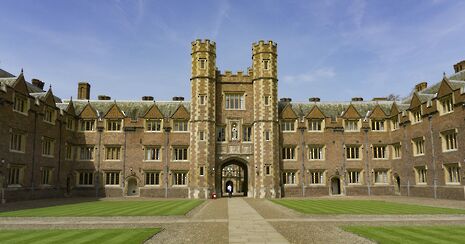Your college should never define your abilities as a student
Even if their college’s performance is lower as a whole, no undergraduate at Girton, Hughes Hall or Lucy Cavendish deserves to be pre-judged as a result

Inter-college rivalries have long been a mainstay of life at the University of Cambridge. At their best, they promote bonding, instil a healthy sense of competition and inspire pride. Direct academic competition between colleges, however, is a newer phenomenon – Class Lists have been posted on the boards outside Senate House for centuries, but Peter Tompkins’ ranking was first produced just 35 years ago.
Cambridge’s yearly fixation with the Tompkins Table is but one facet of our idiosyncratic obsession with league tables and rankings. It perpetuates a culture of generalisation, in which students are defined not by their individual merit, but the overall performance of their college. Instead of fostering a sense of community and shared academic ambition, students are pitted against one another. Even if their college’s performance is lower as a whole, no undergraduate at Girton, Hughes Hall or Lucy Cavendish deserves to be pre-judged as a result.
The Tompkins Table’s fame and reach is peculiar. Previously published by The Independent, it was heralded as news of national interest. Such fanfare seems strange for what is effectively an unofficial ranking based on publicly available information. It appeals to a fixation on hierarchy – that should be recognised even within the narrow internal field of ‘elite’ institutions such as Oxbridge. In contrast, the University of Oxford’s counterpart, the officially-released Norrington table, is merely updated annually on an easily accessible page of the university’s website.
On Thursday, Varsity revealed that some members of Regent House had opposed a ‘Grace’ that would approve the abolition of Class Lists. Emotions are running high among both students and University officials. Already, a petition entitled ‘Save The Class List’ has garnered over 700 signatures, positioning the Class List as an essential relic of Cambridge tradition, and arguing that it is beneficial to student welfare. A referendum will be held in October – even if successful, should Regent House pass the Grace it may just mark the beginning of a new, and most likely futile, struggle to have the lists re-introduced.
While the table may seem to offer a declarative ranking of colleges, its usefulness in isolation – without taking into account value-added scores, funding or intake – is questionable.
It also ignores the more hidden differentials between colleges. A wealthy college can afford to incentivise its students by offering financial rewards to those who achieve the best grades. At Trinity, for example, undergraduates who achieve first-class honours in their final exams are offered a fully-funded Master’s, as well as preference in room choice and a financial reward in earlier years. At the other end of the scale, Wolfson College does not even offer a performance-ranked room ballot. The few hundred pounds which many colleges award their scholars can make a huge difference, especially in a city as expensive as Cambridge.
The University insists that ‘[n]o Colleges are ‘better’ for certain subjects’, but there is undeniably still a large lack of transparency about the prizes and other financial incentives which are on offer.
That is not to disparage Trinity – which generously re-distributes its substantial wealth through both the Isaac Newton Trust, and has given around £5 million directly to other colleges over the past decade.
The University of Cambridge needs to do more to increase transparency about incentives, and take efforts to enforce college equality more seriously.
News of the introduction of pan-College Tripos prizes such the one established last month are hugely welcome, and a pivot towards a more pan-collegiate prize-giving system should be encouraged.
If Cambridge continues to takes steps to both further encourage students and reward their achievements no matter what their college, and students are further encouraged, should it continue, to take the Tompkins Table with a pinch of salt, then it will be a hugely important step – towards a University which fully celebrates the principles of egalitarianism and meritocracy which should underlie all academic endeavour.
 News / Night Climbers call for Cambridge to cut ties with Israel in new stunt15 April 2024
News / Night Climbers call for Cambridge to cut ties with Israel in new stunt15 April 2024 News / Police to stop searching for stolen Fitzwilliam jade17 April 2024
News / Police to stop searching for stolen Fitzwilliam jade17 April 2024 News / Cambridge University cancer hospital opposed by environmental agency12 April 2024
News / Cambridge University cancer hospital opposed by environmental agency12 April 2024 Interviews / In conversation with Dorothy Byrne1 March 2024
Interviews / In conversation with Dorothy Byrne1 March 2024 Interviews / ‘It fills you with a sense of awe’: the year abroad experience17 April 2024
Interviews / ‘It fills you with a sense of awe’: the year abroad experience17 April 2024



